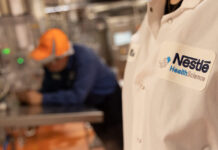
Nestlé R&D is partnering with IBM Research to develop new tools that leverage the power of Artificial Intelligence and deep tech to bring breakthrough innovations to life. This research collaboration has led to the development of a generative AI tool that can identify novel high-barrier packaging materials.
Packaging helps to protect food and beverages while also preventing food waste. Nestlé is continuously reducing the use of virgin plastic, pioneering the use alternative materials and novel technologies, and moving to recyclable mono-material and paper-based solutions. Identifying new packaging materials that meet each product’s functional needs while ensuring food safety and quality is often meticulous. In some cases, this requires years of research.
Nestlé and IBM scientists leveraged AI-based processing techniques to construct a knowledge base of known materials from public and proprietary documents. Subsequently, the team fine-tuned a fit-for-purpose chemical language model on this curated corpus, enabling it to learn the representation of the molecular structures.
Using that knowledge, the teams leveraged the recently developed regression transformer by IBM Research to learn the correlation between key structural molecular features and the resulting physical-chemical properties. The resulting model can now propose entirely new high-barrier packaging materials that shield sensitive products from moisture, temperature swings and oxygen.
Nestlé will utilize this novel technology to identify future packaging materials, while considering cost, recyclability, and functionality.
Stefan Palzer, Nestlé chief technology officer, said, “This novel AI-powered language model, developed in collaboration with IBM Research, illustrates how Nestlé is leading the digital transformation within the food and beverage industry. In the future, such breakthrough technology could be used to optimize the development of more sustainable packaging solutions across product categories.”
Alessandro Curioni, IBM Research VP Europe & Africa, “We do believe that Generative AI will continue to disrupt scientific discovery, impacting the core business of all knowledge-based industries, allowing critical differentiation and sustainable growth.”
Nestlé continues to leverage AI, machine learning, data science and automation to support innovation and help manage complexities. For example, Nestlé has developed a recipe optimization tool that uses advanced algorithms to help product developers better manage tradeoffs between ingredients, nutrition, cost and sustainability, while still meeting consumer expectations. The company also uses digital twins of equipment and production lines to optimize manufacturing processes and has developed digital tools to deliver personalized nutrition solutions for people and pets.
Nestlé recently announced the creation of a new R&D center for deep tech, a first-of-its-kind in the food and nutrition industry. The new center will screen, test and develop new generations of sensors, robots, coding systems, high-performing AI and virtual/mixed reality solutions to increase efficiency in research, innovation and operations.
IndiFoodBev — authentic, impactful and influential
An English-language food and beverage processing and packaging industry B2B platform in print and web, IndiFoodBev is in its third year of publication. It is said that the Indian food and beverage industries represent approximately US$ 900 billion in revenues which implies more than 20% of the country’s GDP. Eliminating the wastage on the farmside can help to deliver more protein to a higher number of the population apart from generating sizable exports. The savings in soil, seeds, water, fertilizer, energy and ultimately food and nutrition could be the most immense contribution that country is poised to make to the moderation of climate change.
To improve your marketing and grow sales to the food and beverage processing and packaging industry, talk to us. Our research and consulting company IppStar [www.ippstar.org] can assess your potential and addressable markets in light of the competition. We can discuss marketing, communication, and sales strategies for market entry and growth.
Suppliers and service providers with a strategy and budget for targeted marketing can discuss using our hybrid print, web, video, and social media channels to create brand recognition linked to market relevance. Our technical writers are ready to meet you and your customers for content.
The second largest producer of fruit and vegetables in the world is continuously expanding processing capacities and delivery systems with appropriate innovative technologies. We cover product and consumer trends, nutrition, processing, research, equipment and packaging from farm to thali. Get our 2025 media kit and recalibrate your role in this dynamic market. Enhance your visibility and relevance to existing markets and turn potential customers into conversations. Ask for a sample copy of our bi-monthly in print or our weekly IndiFoodBev eZine each Wednesday.
For editorial info@ippgroup.in — for advertisement ads1@ippgroup.in and for subscriptions subscription@ippgroup.in
Naresh Khanna – 10 February 2025
Subscribe Now











